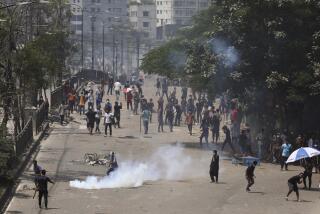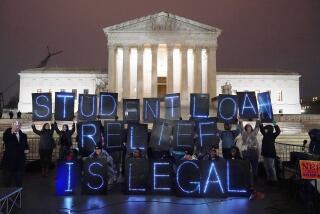India Court to Weigh Halt in Jobs Plan
- Share via
NEW DELHI — India’s Supreme Court agreed Saturday to hear an appeal to halt a plan that reserves nearly half the civil service posts for low-caste Hindus. The policy has led to a rash of protest clashes and suicides.
A panel of five justices is expected to meet Monday on an application by the Supreme Court Bar Assn. for a temporary injunction on the program, announced Aug. 7 by Prime Minister Vishwanath Pratap Singh to counteract centuries of discrimination.
The appeal seeks to suspend the quota program until a Nov. 6 hearing on its legality.
Meanwhile, some members of Singh’s Janata Dal party in Parliament issued a letter accusing him of mishandling the issue and demanding his resignation.
Leaders of the critics refused to say how many people signed the letter, but most had previously been aligned with Singh’s party rivals, Indian news agencies reported.
Four upper-caste students committed suicide to protest the policy, and one person died from gunshot wounds Friday when police tried to quell riots in Hansi, about 50 miles northwest of New Delhi.
Thirteen youths have taken their lives the past 10 days, some burning themselves or taking poison. Each left a note blaming the job policy. Also, 48 people have died by police gunfire in street battles.
White-collar government jobs are highly coveted by graduates in India, where more than 5 million educated people are unemployed, according to official figures. The government employs about 18 million people.
K.K. Venugopal, president of the bar association, said he hopes an injunction will stop the wave of suicides. A three-member Supreme Court tribunal had earlier declined to intervene in the case.
Singh has refused to retract or delay the policy to increase the low-caste job quota to 49%, saying it is necessary to reverse centuries of discrimination. Previously, 22% of jobs were reserved for the lower castes.
India’s complex Hindu caste system sets social levels according to birth, ranging from the top-level Brahmins to the Sudras, who do menial tasks. Below them are the Untouchables. Tradition forbids them to wear shoes, ride bicycles or share a water well with caste Hindus.
Upper-caste students say that reverse discrimination will deprive them of jobs even though they are better qualified. Hoping to ease student anger, the government announced a plan to create 3 million new jobs in five years in this nation of 880 million people.
The unrest has also threatened the stability of Singh’s minority National Front coalition.
Singh’s allies have attacked his handling of the demonstrations, though none has criticized the idea of reserving jobs for deprived classes.
India, which is 82% Hindu, embraced secularism and socialist ideals when it became independent from Britain in 1947. It pledged to discard the caste system, but the ancient social order continues.
More to Read
Sign up for Essential California
The most important California stories and recommendations in your inbox every morning.
You may occasionally receive promotional content from the Los Angeles Times.










